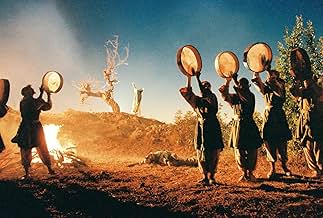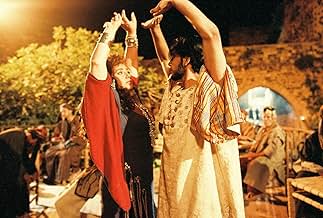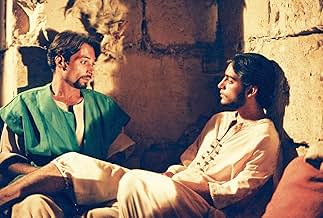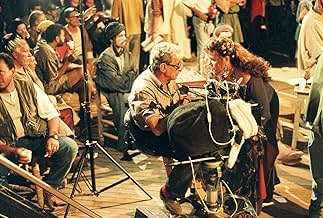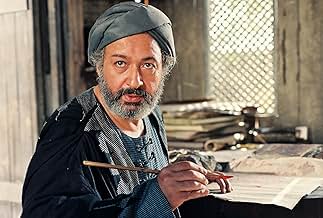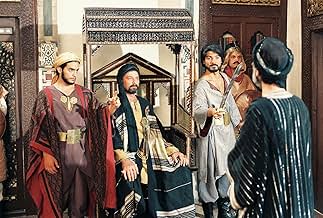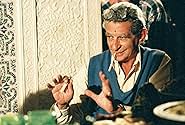Al-massir
- 1997
- 2h 15min
Agrega una trama en tu idiomaThe story is set in the 12th century in Arab-ruled Spanish province Andalusia, where famed philosopher Averroes is appointed grand judge by the caliph and his liberal court judgments are not... Leer todoThe story is set in the 12th century in Arab-ruled Spanish province Andalusia, where famed philosopher Averroes is appointed grand judge by the caliph and his liberal court judgments are not liked by everyone. The caliph's political rivals, centered around the leader of a fanatic... Leer todoThe story is set in the 12th century in Arab-ruled Spanish province Andalusia, where famed philosopher Averroes is appointed grand judge by the caliph and his liberal court judgments are not liked by everyone. The caliph's political rivals, centered around the leader of a fanatical Islamic sect, force the caliph to send Averroes into exile, but his ideas keep on livin... Leer todo
- Dirección
- Guionistas
- Elenco
- Premios
- 2 premios ganados y 1 nominación en total
- Averroes
- (as Nour El Cherif)
- Al Mansour, The Caliph
- (as Mahmoud Hemeida)
- Averroes' Wife
- (as Safia El Emary)
- Nasser, The Crown Prince
- (as Khaled El Nabaoui)
- The Caliph's Brother
- (as Seif Abdel Rahman)
- Emir of the Sect
- (as Magdi Idris)
- Gaafar
- (as Hasan El-Adl)
- Dirección
- Guionistas
- Todo el elenco y el equipo
- Producción, taquilla y más en IMDbPro
Opiniones destacadas
The film had a great deal of technique and style. Although the film is set in the past, the language of the script is in colloquial Arabic, which is spoken on the streets of Egypt at this point in time. Making delivering the content of the words more important than giving the audience a believable setting. Aside from being a historical representation it was a philosophical thought on religion, society and politics. Some of the obvious themes in the film were as follows. The freedom of thought expressed in the power of the written and spoken word as a form of representation of the people, what they stand for, and their sufferings. In addition to the self and social destruction caused by ones political motivation hidden behind a religious façade.
Finally the film brings great memory of Francois Truffaut's `Fahrenheit 451'-. In making the point that one can burn all the books in the world, but that would never take what is in the books away from the people, because true words, weather written or memorized, are humanities memory and being till the end of time. Both films complement each other, one can darlingly view, `Al-Massir' as the beginning of a time that was elaborately explored in `Fahrenheit 451.' Both films had the same ending, in which the books were burnt and the words were kept in the memory of the people, independent of what the present political power did. The words of scholars, philosophers and story tellers live forever.
The story is set in medieval Moorish Spain, about the conflict between Averroes; a historical humanistic Muslim philosopher; and a group of reactionary fundamentalists. It is very well acted and the characters are sympathetic as well as credible. Often forgotten is that many of the Islamic societies of the Early Middle Ages (particularly in Spain) were ahead of Europe in science, mathematics, medicine, religious tolerance and many intellectual pursuits. But, there were periodic and sometimes serious conflicts with those who resented these trends.
This is not just an historical epic. The Egyptian director, a very courageous man named Youssef Chanine, deliberately molded the script to show how fanaticism undermines not only a society's intellect, but destroys it's soul. Particularly disturbing, but highly relevant to our times, is showing the subtle manner in which young men are recruited into these movements and about how empty and dishonest they turn out to be.
Although the population of medieval Andalusia was 10-15% Jewish and Averroes had extensive contact with both Jewish and Christian intellectuals, there isn't a Jew in sight and the only Christians are depicted as evil, fanatical, external enemies who enter into a secret pact with the fundamentalist cult. While this is not entirely accurate and a gross simplification of the actual situation at the time, I don't fault Mr. Chanine. He has endured extreme legal harassment in the Egyptian courts over this and another film as well as extensive death threats against himself and his family. Merely exploring the themes portrayed in this movie has put his head on the chopping block, and any sympathetic depiction of Jews or Christians would have resulted in the banning of the film and possibly his head rolling into the basket. He deliberately crafted this film to educate his own society about the debasement and moral corruption wrought by cultism and violence, and, no doubt, wanted to make sure the message got out.
A bold, and gently provocative film by a very brave man.
¿Sabías que…?
- TriviaAccording to an interview actor Nour El-Sherif stated that the role of Ibn Roshd was supposed to be played by director Youssef Chahine himself, but Nour told him that he was not suitable for the role.
- Citas
Caliph's brother: Thoughts have wings. No one can prevent them from flying.
- ConexionesFeatured in Humbert Balsan, producteur rebelle (2006)
- Bandas sonorasAlli sotak
and "Gamr el Hawa", words by Sameh El Kodoussi and Kawssar Mostapha, music by Kamal El Tawil
Performed by Mohamed Mounir
Selecciones populares
- How long is Destiny?Con tecnología de Alexa
Detalles
- Fecha de lanzamiento
- Países de origen
- Idiomas
- También se conoce como
- Destiny
- Locaciones de filmación
- Krak des Chevaliers, Syria(sect training grounds)
- Productoras
- Ver más créditos de la compañía en IMDbPro
Contribuir a esta página


